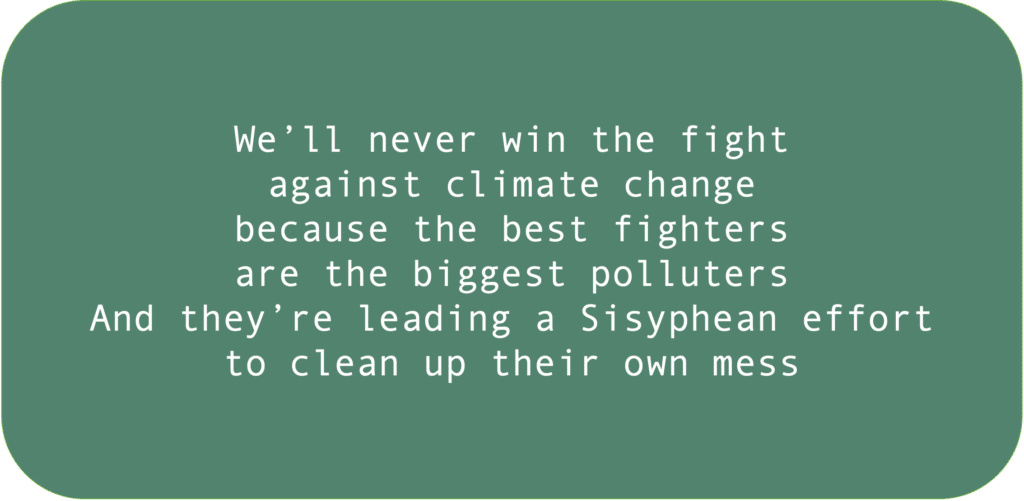
First Earth Day
Former Senator Gaylord Nelson (D-WI) conceived Earth Day as a day of awareness in the late 1960s. He responded to the alarming pollution spreading carelessly across America, marking a pivotal moment in our environmental history.
The country celebrated its first Earth Day on April 22, 1970. The environmental practices it inaugurated have since become routine and universal. Now, the symbolic replenishing of Earth’s natural resources, such as planting trees, often seems trite or contrived.
Except that hypocrisy hovers like a dark cloud over today’s Earth Day celebrations. On the one hand, we’re celebrating practices that nurture Mother Nature, but on the other hand we’re causing environmental degradation, which has us marching eyes wide shut toward a climate catastrophe.
Frankly, this schizophrenic dichotomy between fighting and willfully exacerbating climate change poses the most stupefying global challenge in human history
An inconvenient truth: biggest polluters are our saviors
When it comes to global emissions, the biggest culprits are China, the United States, and India. Their pollution casts a long, dark shadow over international efforts to combat climate change, making it a truly global challenge.

But no country reflects the schizophrenic dichotomy afoot like China. After all, it is the biggest polluter of fossil fuels that cause climate change and the biggest producer of renewable energy to combat climate change.
The United States is not far behind. And nothing betrays its schizophrenic dichotomy quite like toggling between withdrawing from and rejoining international climate accords. But, notably, President Biden championed unprecedented climate legislation, which earmarked billions for clean energy, electric vehicles, and climate justice.
India overtook China last year as the world’s most populace nation. That has the vastly poorer India doubling down on its developmental aspirations. But, unlike China’s, India’s renewable projects do little to offset its fossil fuel emissions. While China leads the world in renewable energy, India is not even among the top ten producers.
Is it any wonder that, by 2050, climate change will cost $38 trillion per year?
Scientists at the Potsdam Institute for Climate Impact Research in Germany found that the likely economic damages of climate change during the next quarter century outweigh by six times the costs of mitigating global warming and holding it to 2°C above preindustrial levels.
(Axios, April 18, 2024)
Tech to the rescue? The double-edged sword of innovation
Social media have exposed tech innovation’s downsides in spades. That’s why it seems oxymoronic that the world now looks to technology as a global oxygen mask against the choking clouds of carbon emissions.
Innovations in green technology are flourishing. Governments and companies are investing billions in renewable energy, electric vehicles, and carbon capture systems. These advancements promise a cleaner, more sustainable future.
But this transition is fraught with challenges. The sheer scale of implementation required to make a noticeable impact is daunting enough. Exhibit A: Tesla is leading America’s EV revolution. But defects and delays have dogged its production lines.
The downward spiral Tesla is experiencing is foreboding. It highlights the shortcomings and pitfalls of relying on notoriously flighty tech companies to save us from the looming climate change catastrophe.
Rich environmentalists and the hypocrisy of carbon offsets
Many rich environmentalists boast carbon footprints bigger than those of many small countries. Their private jets, mega-yachts, and sprawling estates are just a few of the indulgences that cause them to contribute disproportionately to global emissions.

But don’t call these elite eco-warriors hypocrites. Because they’ve convinced themselves that purchasing carbon offsets absolves them of guilt. This, of course, harkens back to when backsliding Catholics thought purchasing papal indulgences absolved them of sin.
That’s why the likes of Leonardo DiCaprio and Al Gore, the John the Baptist of the environmental crusade, take pride in championing environmental causes. Their patronage includes everything from serving as guest preachers to environmental choirs across the globe to funding conservation projects.
Change needed to fight climate change
I fully support this existential fight. It’s just that, as the son of a preacher man, I am all too mindful of false prophets preaching messages of imminent doom.
That’s why I feel a special duty to call out rich environmentalists. I do so, especially when those like Gore get more attention and acclaim for sounding alarms than scientists like Bjorn Lomborg, who offer practical and pragmatic strategies for combating climate change.
Innovative technology and prophets of doom will not save us from the looming climate change catastrophe. Only fundamental shifts in global consumption and lifestyle will do. Rich environmentalists should give up their do-as-I-say-not-as-I-do lifestyles and lead by example.
We must end the schizophrenia of destruction and innovation, indulgence and philanthropy. We must stop deluding ourselves with mercenary solutions or guilt-ridden donations, which characterize this fight in rich countries. And I say that with all due respect to everything from old-fashioned recycling to newfangled blue carbon management.
Instead, we must commit to sustainable development, as defined by the impact climate change is having in poor countries. So here’s to marking Earth Day as a catalyst for real change rather than as a symbolic rite of passage down a primrose path to environmental doom.